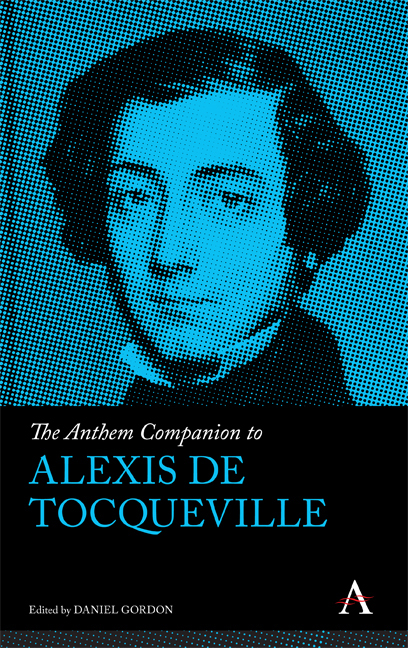Book contents
- Frontmatter
- Contents
- Introduction: Tocqueville and the Sociological Conversation
- A Note on References to Democracy in America
- Part 1 Religion And Immaterial Interests
- Chapter 1 Tocqueville on Religion
- Chapter 2 Unmasking Religion: Marx's Stance, Tocqueville's Alternative
- Part 2 Language, Literature, and Social Theory
- Part 3 Globalism and Empire
- Part 4 Inequalities Inside Democracy
- Part 5 Citizenship, Participation, and Punishment
- Part 6 An Unfinished Project
- Notes on Contributors
- Index
Chapter 1 - Tocqueville on Religion
from Part 1 - Religion And Immaterial Interests
Published online by Cambridge University Press: 12 July 2019
- Frontmatter
- Contents
- Introduction: Tocqueville and the Sociological Conversation
- A Note on References to Democracy in America
- Part 1 Religion And Immaterial Interests
- Chapter 1 Tocqueville on Religion
- Chapter 2 Unmasking Religion: Marx's Stance, Tocqueville's Alternative
- Part 2 Language, Literature, and Social Theory
- Part 3 Globalism and Empire
- Part 4 Inequalities Inside Democracy
- Part 5 Citizenship, Participation, and Punishment
- Part 6 An Unfinished Project
- Notes on Contributors
- Index
Summary
Description of man. Dependence, desire for independence, needs. It is not good to be too free.
Pascal (1995, 22, 28)Man's true grandeur lies only in the harmony of the liberal sentiment and religious sentiment, both working simultaneously to animate and to restrain souls.
Tocqueville (Boesche 1985, 294–95)Religion suffused the life and thought of Alexis de Tocqueville. Though one might easily think freedom itself is Tocqueville's religion (freedom is “a holy thing” [2010, 3:722n]), religion is, instead, freedom's crucial necessary condition: “If [man] has no faith, he must serve, and if he is free, he must believe” (2004, 503). Essentially, Tocqueville argued that the instability and independence of freedom require the stabilizing and authoritative force of religion in order to preserve the long-term freedom of a democratic citizenry. This vision of a productive tension between the stability of religion and the instability of freedom is the most important instance of a more general tension in the human soul between dependence and independence, and it is impossible to understand the role of religion in Tocqueville's thought without first considering his views on dependence and independence more generally. Given that the sociology of religion has only recently emerged from the hegemony of the “secularization thesis,” it is not surprising that his account of religion and democratic freedom has yet to be systematically developed. It nevertheless remains, perhaps more than ever before, a remarkably promising framework for reflection on democratic political life.
Born to aristocratic Catholic parents and tutored by the Abbé Le Sueur, a Jansenist priest and friend of the family, Tocqueville had a deeply religious childhood. At the age of 15 he left for Metz to join his father, a government official often away from home, in order to finish his secondary schooling. Precocious and intellectually hungry, he spent the summer vacation of 1821 in his father's library reading the classics of the Enlightenment and before the end of the summer had experienced an intense spiritual crisis. Though publicly he remained a practicing Catholic, he no longer accepted the core dogmas of Christianity, and he did not receive communion again until his deathbed.
- Type
- Chapter
- Information
- The Anthem Companion to Alexis de Tocqueville , pp. 3 - 20Publisher: Anthem PressPrint publication year: 2019

